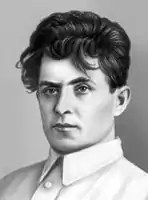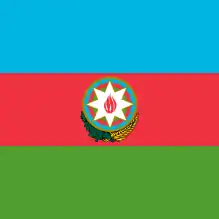Grigory Kaminsky
Grigory Naumovich Kaminsky (Azerbaijani: Griqoriy Kaminski Naum oğlu, Russian: Григорий Наумович Каминский; 1 November 1895 – 10 February 1938) was a Soviet politician who was the 2nd First Secretary of Azerbaijan Communist Party, and one of founders of the health care system in the Soviet Union.[1]
Grigory Kaminsky | |
|---|---|
 Kaminsky in the 1930s | |
| People's Commissar for Health of the USSR | |
| In office 15 February 1934 – 26 June 1937 | |
| Premier | Vyacheslav Molotov |
| Preceded by | Mikhail Vladimirsky |
| Succeeded by | Mikhail Boldyrev |
| First Secretary of the Central Committee of the Azerbaijan Communist Party | |
| In office 24 October 1920 – 24 July 1921 | |
| Preceded by | Mirza Davud Huseynov |
| Succeeded by | Sergey Kirov |
| Personal details | |
| Born | 1 November 1895 Ekaterinoslav, Russian Empire |
| Died | 10 February 1938 (aged 42) Moscow, Russian SFSR, Soviet Union |
| Nationality | Soviet |
| Political party | Russian Communist Party (1917–1937) |
Early life
Kaminsky was born in the family of a Jewish blacksmith in Ekaterinoslav, Ukraine.[2] He graduated from Lomonosov Moscow State University with a degree in Medical Studies. Kaminsky was an active participant of youth revolutionary movement.
Political career
In 1917, he became a member of Moscow bureau of Russian Social Democratic Labour Party, secretary of the party committee in Tula and served in administration of the 2nd army. In 1920–1921, Kaminsky was the First Secretary of Azerbaijan Communist Party, chairman of the Baku Commune and Red Army deputies. From 1922 through 1929, he was the chairman of Central Committee of Vserabotzemles trade union and a chairman of kolkhoz center.
In 1930, he was appointed the Secretary of Moscow State Committee of the Communist Party. In 1934–1937, he served as the People's Commissar for Health of the Soviet Union. He's credited with extensive work in establishing production of medicine, preparation of medical personnel, fighting malaria in Soviet Union and promotion of medical science in education system.[1]
Death
After Kaminsky' controversial speech about wrongful arrests of people by NKVD, in which he accused Beria of past counter-revolutionary activities, he was arrested on 25 June 1937 and sentenced to death on 8 February 1938. He was executed by firing squad.[3] He was posthumously rehabilitated on 2 March 1955.[2]
References
- "Большая Советская Энциклопедия. Каминский Григорий Наумович" [Great Soviet Encyclopedia. Kaminsky Grigory Naumovich]. Retrieved 2010-05-14.
- "Жертвы политического террора в СССР". Lists.memo.ru. Retrieved 2013-06-13.
- "ГРИГОРИЙ КАМИНСКИЙ - ПЕРВЫЙ РЕДАКТОР ТУЛЬСКОЙ ГУБЕРНСКОЙ ГАЗЕТЫ "КОММУНАР" (1918-1920 гг.): СУДЬБА И ПУБЛИЦИСТИКА" [Grigory Kaminsky - First editor of Tula Governorate newspaper "Kommunar" (1918-1920)]. Archived from the original on 2011-01-31. Retrieved 2010-05-14.
